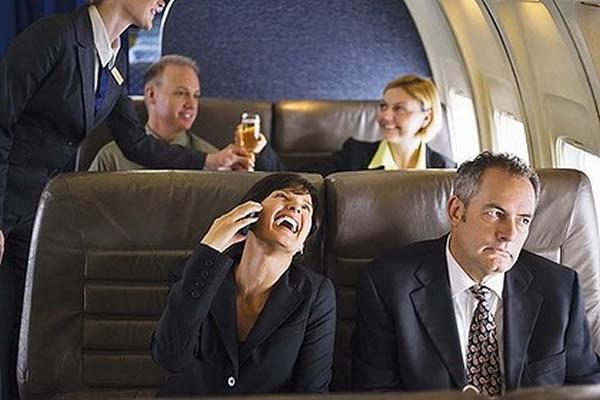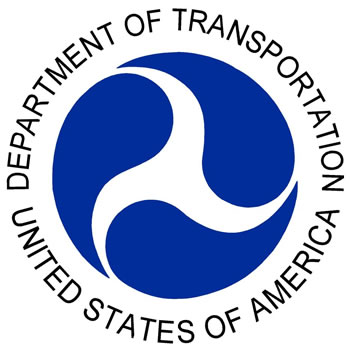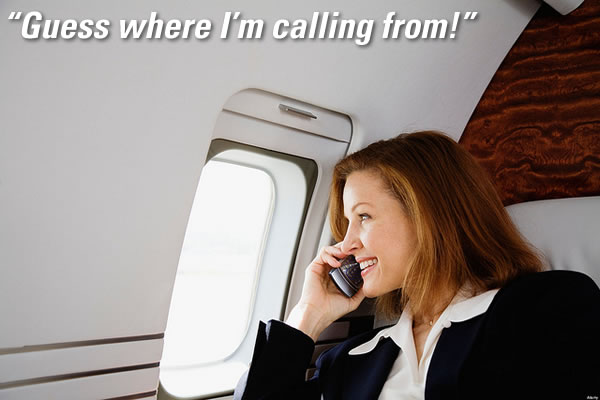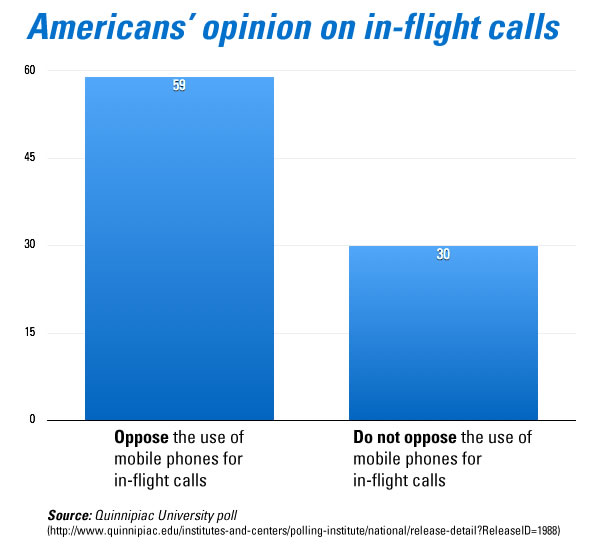
Me, I’d be happy that I’m not in “cattle class”, but I feel the guy’s pain.
Spurred by the recent lifting of the ban on the use of light electronic devices on flights from gate to gate, the FCC (Federal Communications Commission) is now considering lifting the ban on in-flight calls. The ban was on concerns that phone calls made from airplanes, which travel up to 10 times the speed of land vehicles, would play havoc with ground-based cellular networks, especially with rapid switching from cell to cell. Recent advances now allow planes to carry their own “mini cellular towers”, obviating the technological reason for banning calls on flights.

The FCC are divided on the issue, but in a 3 to 2 vote they chose to seek public comment on a proposal to lift the ban. FCC Chairman Tom Wheeler seems to express different opinions on the matter, depending on who’s asking:
- To assuage the concerns about spending a cross-country flight trapped next to a chatterbox, he’s aid “Nothing will be different on your flight tomorrow. We’re just seeking comments on the proposal.”
- However, at a House hearing earlier today, he replied “strongly yes” when asked if he planned to lift the ban on in-flight calls. “This is the responsible thing to do. Where the rationale for the rule doesn’t exist, the rule shouldn’t exist.”
- In written testimony submitted for a congressional hearing on the issue, he tried to tread the middle ground: “I understand the consternation caused by the thought of your onboard seatmate disturbing the flight making phone calls. I do not want the person in the seat next to me yapping at 35,000 feet any more than anyone else. But we are not the Federal Courtesy Commission.”
- He reinforced his written statement that the FCC is not Emily Post when speaking at that congressional hearing “The FCC is the expert agency when it comes to technical communications issues. We are not the Federal Courtesy Commission. Our mandate from Congress is to oversee how networks function.”
- In an editorial he wrote for USA Today, he says “it’s not me, it’s you“: “In a free market such decisions belong in the hands of the airlines and their consumers.”
FCC Commissioner Jessica Rosenworcel was one of the 3 who voted for accepting public comments on lifting the ban, but she herself is against the proposal. She flies often, says she’s stuck in the dreaded middle seat near the rear of the plane, which would be made even worse by having to put up with a neighbour making calls. “This commission does not need to add to that burden,” she said.

The FCC isn’t the only U.S. government department weighing in on the issue. The DOT (Department of Transportation), whose jurisdiction includes air travel, is also seeking public comment — but on whether allowing such calls is “fair to consumers”. DOT Secretary Anthony Foxx says “Over the past few weeks, we have heard of concerns raised by airlines, travelers, flight attendants, members of Congress and others who are all troubled over the idea of passengers talking on cell phones in flight –- and I am concerned about this possibility as well.”
There’s been bipartisan cooperation on the “anti-in-flight calls” side, with Senators Lamar Alexander (R – Tennessee) and Diane Feinstein (D – California) introducing a bill to ban in-flight mobile phone conversations. ““Keeping phone conversations private on commercial flights may not be enshrined in the constitution, but it is certainly enshrined in common sense,” wrote Alexander in a news release.
This should be an interesting intersection: a body charged with regulating communications devices, another charged with regulating air travel, both trying to rewrite the rules for mobile technology, where both their jurisdictions are being changed and disrupted.
Creative Commons photo by Sam Churchill. Click to see the original.
We’ve had in-flight-calling in North America before, if you recall those bulky, wired phones with credit card readers installed above the meal tray ion the seat in front of you. Those are the products of a different time, when some people thought it was a little odd to walk down the street while having a conversation on your mobile phone, and certainly before we watched movies, checked email, or played Candy Crush on them. The high prices for using those phones also kept calls on them quite short (many of the calls started with “Guess where I’m calling from!” and were followed by making arrangements to meet at the destination airport).
Outside North America, there are about two dozen airlines who have the necessary “mini cell tower” technology installed on their aircraft and allow their passengers to make in-flight calls. There are cultures where phone etiquette and rules about things like personal space are different, and in some cases, there are cultures where in-flight calls are probably a small annoyance compared to in-flight binge drinking.
There are also issues of the practicality of enforcing the ban on in-flight calls. Now that mobile phones are small computers are more than portable phones, but computers that just happen to let you make phone calls, allowing SMS messaging and the use of apps that use cellular data to access the internet but disallowing voice calls is legal hair-splitting. On the increasing number of flights that have wifi service, what’s the practical difference between holding a Skype voice chat on a laptop or tablet and a phone call?
The FCC is quite likely to lift the ban on in-flight calls. As Chairman Wheeler points out, their mandate is to regulate the functioning of networks, and not the behaviour of individuals using them. However, the DOT, as a body that regulates transportation, may be able to institute a ban on the use of voice communications technologies in flights if a threat to safety or the smooth functioning of a flight exists. Veda Shook, president of the Association of Flight Attendants International, makes such a case:
“As first responders in the aircraft cabin, flight attendants know that this reckless FCC proposal would have negative effects on aviation safety and security. In far too many operational scenarios, passengers making phone calls could extend beyond a mere nuisance, creating risks that are far too great. As the last line of defense in our nation’s aviation system, flight attendants understand the importance of maintaining a calm cabin environment, and passengers agree.”
In the likely case that the the ban on in-flight calls is lifted, it still doesn’t mean that you’ll be able to make a call on any U.S. flight. The airline would still have the final say on whether you can make a call, and even if they allowed them, they’d still have to install the “mini tower” technology.
Click the graph to see the source data.
In the end, the airlines will likely leave it to the passengers to vote with their dollars. If the data from a recent survey conducted by Quinnipiac University holds true for the market in general, passengers will vote 2 to 1 against in-flight voice calls. Delta Air Lines has already announced that they won’t allow in-flight voice calls, and Southwest’s CEO has said that he doesn’t favour a change in polciy, citing the Quinnipiac survey.


4 replies on “FCC: Phone calls on planes! DOT: Whoa there, cowboy. [Updated]”
[…] though it the FCC’s lifting of the ban on in-flight calling seems pretty assured — FCC Chairman Tom Wheeler seems quite hot to trot to remove it — it doesn’t guarantee that you’ll be able to make calls on just any flight. […]
[…] In case you were wondering, Delta and JetBlue have gone on the record saying that they won’t allow in-flight calls, and public opinion is generally against them: […]
[…] In case you were wondering, Delta and JetBlue have gone on the record saying that they won’t allow in-flight calls, and public opinion is generally against them: […]
[…] In case you were wondering, Delta and JetBlue have gone on the record saying that they won’t allow in-flight calls, and public opinion is generally against them: […]